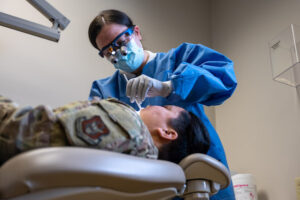
Story by Staff Sgt. Timothy Leddick
911th Airlift Wing
Many have an idea of what jobs exist within the U.S. Armed Forces based on what’s seen. Maintainers working on aircraft, followed by pilots taking off, security forces defending bases or government assets and aeromedical evacuation and staging Airmen performing patient transportations. However, many may not know about the unsung positions that preserve our mission readiness and health, such as the dental clinic.
The 911th Aeromedical Staging Squadron dental team consists of nine Airmen who work to ensure members are deployment ready through maintaining optimal health, oral or otherwise.
The Air Force dental component is composed of commissioned officer dentists and enlisted dental assistants. Air Force dentists directly maintain dental health through means of examining, diagnosing and treating oral diseases, abnormalities and injuries. This includes routine preventative exams, the evaluation of results and developing and reviewing treatment plans with patients. Dental assistants are integral members of the dental team, supporting patient care by performing tasks such as capturing and developing dental x-rays, guiding patients through examination procedures, scheduling appointments and meticulously maintaining dental health records.
Though these respective skill sets can be learned before or after military training, there are differences in how the Reserve utilizes its dental team compared to those serving in Active Duty.
“For the Reserve you have your general dentists who deal with common things like cavities and crowns,” said Maj. Emily Steiner, a 911th ASTS general dentist. “The dental assistants typically take front desk duties and are a huge part in ensuring proper supplies are stocked, acquiring prescribed x-rays and they’re the ones that set up and clean up for all our procedures.”
The Air Force Reserve dental clinic’s primary function is to diagnose oral pathology and disease, as it does not hold the same treatment capacity the AD component does. This examination process includes checking blood pressure, medical history reviews, x-rays, performing intraoral and extraoral assessments and discussing respective treatment recommendations.
“‘Diagnose, inform, educate’ are how I summarize our primary function,” said Steiner. “I also always underscore that treatment planning is a continuum. Should you ever feel that a provider out there is aggressive or you feel uncomfortable or hesitant about a treatment plan, feel free to stop by for a second opinion.”
Air Force dentists are required to have either a Doctor of Dental Surgery or Doctor of Medicine in Dentistry degree from an American Dental Association-accredited college or university in order to commission. Afterward, they will be required to attend an Officer Training School course for 5 ½ weeks at Maxwell Air Force Base, Alabama. To become an enlisted dental assistant requires attending a 7-week course at Fort Sam Houston, Texas, after basic military training.
The operation of an Air Force and Air Force Reserve dental clinic requires the collaborative effort of both the commissioned officer and enlisted forces. Each plays a crucial role in maintaining and treating the oral health of Airmen and families. The coordination and record-keeping of patients and appointments are imperative to ensuring proper operation and function of the clinic.
“As much as we would like the doctors themselves to coordinate care, I would argue our enlisted members are vital to coordinating that care,” said Steiner. “Generally they’re the ones providing post-op instructions and really getting that one-on-one time with our patients.”
Steiner states that dental assistants are the patient’s advocate. While the dentist may be honed into the procedure, the dental assistant has eyes on the whole picture and may notify when a patient is visibly anxious, when they need a break or provide additional assistance to ensure the best comfort and care.
Overall, the dental clinic’s central purpose in the Air Force is ensuring members are medically ready to deploy. Dental emergencies may spur out of nowhere and dental pain can be debilitating and affect one’s ability to efficiently perform on duty. Assessments and connection not only encompass oral and dental health, but mental health as well. The dentist’s chair at times may also serve as an impromptu therapy chair.
“One aspect that I find really rewarding is the ability to get to know my patients,” said Steiner. “I always talk to my patients about what’s going on in their life that might be impacting their oral health and at times I find mental health concerns that may arise.”
Patients have been able to open up within the dental clinic and have been able to receive proper care and much needed conversations in doing so. Steiner mentions dental professionals have even been able to intervene with members who have contemplated suicide.
Air Force dental professionals constitute a cohesive group of individuals who excel in fostering interpersonal connections and extend their care beyond the realm of oral health. Through comprehensive services and compassionate care, the 911th ASTS dental team strives to ensure optimal dental wellness, enhance operational readiness and contribute to the overall mission success of the United States Air Force.